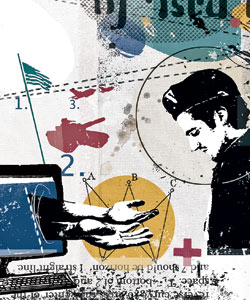 |
Last year, Richard Gengler and Roger Sweis were given an assignment: create a new venture for a class at the University of Chicago’s Booth School of Business. The two friends had markedly different backgrounds. Gengler had spent ten years flying fighter jets for the navy, including combat missions in Iraq during the first months of the war in 2003. Sweis had been the CEO of a mental health clinic in Oak Forest. Together, they came up with an idea that was uniquely suited to them both: an online counseling service that uses a Facebook-like application to comfort war-weary veterans.
After graduation, Gengler and Sweis turned their class project into a full-fledged business, Prevail Health Solutions. They’re now launching Vets Prevail, a counseling service that consists of six weekly online lessons, each focusing on a goal such as improved problem solving or better moods. The lessons are reinforced with homework and online chats with a peer counselor or clinician, and there’s a social networking site where graduates can keep in touch. The founders say it’s the first Web-based mental health program in the country aimed specifically at veterans.
While Vets Prevail is still in the testing phase, it’s clear that the old model hasn’t been working. About 20 percent of active-duty soldiers and 40 percent of guard soldiers and reservists require mental health treatment when they get home, according to a report in The Journal of the American Medical Association. Yet the Rand Corporation found that only about half of those who need treatment seek it, and just a quarter receive adequate help. In addition to wanting to avoid the stigma of seeking mental health treatment, vets are often busy rebuilding their civilian lives and can’t find time to make it to veterans’ centers.
“There will be a large pool of people who this would help, some of whom otherwise wouldn’t come in at all,” says Daniel Luchins, chief for mental health research at the Jesse Brown Veterans Affairs Medical Center in Chicago, who is leading a clinical trial of the program there this fall.
The target participants are the “reluctant help seekers,” says Eric Proescher, a psychologist who coordinates the Operation Enduring Freedom/Operation Iraqi Freedom Outreach Program at Jesse Brown. “They are often dragged in by significant others who say, ‘If you don’t get help, I’m taking the kids and you’re not going to see them again.’ ”
Or they haven’t slept in months, have lost several jobs, or just racked up another DUI. (Proescher consulted for Prevail early on; Luchins has no financial ties to the company.)
Funded in part by the National Science Foundation, the McCormick Tribune Foundation, and individual investors, Vets Prevail hopes to sell the computer program to government agencies. As for the concern that soldiers would be better served by face-to-face counseling, Luchins thinks tapping into the attachment of this generation of veterans to the Internet is key. “This is a difficult group of people to get access to,” he says.
Jason Sikorski, 32, served ten years in the air force, including a deployment to the United Arab Emirates in 2003, before leaving active duty as a staff sergeant two years ago. He went through Vets Prevail this spring in a focus group, and he says the program helped him reconnect with friends and family. For example, his homework one week was to schedule time to show affection to loved ones. At first it seemed strange, but he found himself returning his three children’s hugs more sincerely. “It makes you think there is life beyond what you experienced,” he says.
Gengler and Sweis hope they can do the same for others: Vets Prevail will launch statewide this winter—just in time to serve the nearly 3,000 Illinois National Guard soldiers who are returning home from the Middle East.
Illustration: Kelly Schykulski/colagene.com


